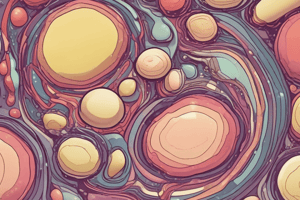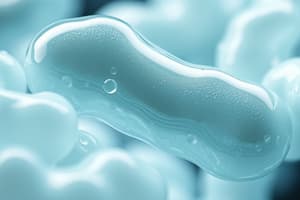Podcast
Questions and Answers
What do fats, steroids, and waxes have in common?
What do fats, steroids, and waxes have in common?
- Both (a) and (c).
- They occur in membranes.
- Both (b) and (c).
- Low solubility in water. (correct)
- Moderate polarity.
What would a good student say to Dr. Haxton's statement about fats and phospholipids?
What would a good student say to Dr. Haxton's statement about fats and phospholipids?
Nonpolar molecules aren't compatible with water.
The presence of many C-C and C-H bonds causes fats to be...
The presence of many C-C and C-H bonds causes fats to be...
- Insoluble in water.
- Low in energy.
- Both (b) and (c).
- Rich in energy.
- Both (a) and (b). (correct)
In fat synthesis, ________ and fatty acids combine to make fats plus ________.
In fat synthesis, ________ and fatty acids combine to make fats plus ________.
In the reaction that builds a fat, ________ groups react with ________ groups.
In the reaction that builds a fat, ________ groups react with ________ groups.
Triglycerides vary with respect to the number of...
Triglycerides vary with respect to the number of...
A food company hydrogenated a barrel of fat. The treatment...
A food company hydrogenated a barrel of fat. The treatment...
The most unsaturated fats have...
The most unsaturated fats have...
What do DNA, proteins, and fats have in common?
What do DNA, proteins, and fats have in common?
Which of these is NOT a lipid?
Which of these is NOT a lipid?
Which of these is rich in unsaturated fats?
Which of these is rich in unsaturated fats?
A function of cholesterol that does not harm health is its role _____.
A function of cholesterol that does not harm health is its role _____.
Study Notes
Properties of Fats
- Fats, steroids, and waxes are characterized by low solubility in water.
- Nonpolar molecules like fats require phospholipids for transport in the bloodstream due to incompatibility with water.
Fat Structure and Synthesis
- The structure of fats is rich in energy due to the high number of C-C and C-H bonds, making them insoluble in water.
- Fats are synthesized from glycerol and fatty acids, producing fats and water during the reaction.
- In fat synthesis, hydroxyl groups react with carboxyl groups.
Triglycerides and Unsaturation
- Triglycerides vary in the number of carbon atoms and double bonds in their hydrocarbon tails.
- Hydrogenation of fats results in reduced fluidity and potential increases in saturation, leading to fewer kinks in fatty acid tails.
- The most unsaturated fats possess the highest number of double bonds.
Comparison with Other Biomolecules
- DNA, proteins, and fats share the characteristic of containing carbonyl groups.
- RNA is not classified as a lipid, unlike cholesterol, steroids, phospholipids, and waxes.
Dietary Fats
- Olive oil is rich in unsaturated fats compared to butter, lard, and beef fat, which are primarily saturated fats.
- Cholesterol plays a beneficial role as a component of animal cell membranes, despite common associations with health risks.
Studying That Suits You
Use AI to generate personalized quizzes and flashcards to suit your learning preferences.
Description
This quiz focuses on the properties and functions of fats, steroids, and waxes in biological systems as covered in BIO 150. Test your understanding of lipid solubility and interactions with phospholipids. Suitable for students preparing for exams or reviewing key concepts in biology.




